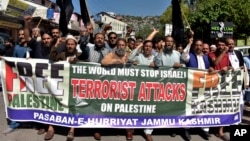While the hostilities between Israel and Hamas have raised doubts about the future of Israel's efforts to develop ties with Saudi Arabia and the wider Muslim world, critics say the hostilities will also significantly restrict public debate in Pakistan about whether to recognize the Jewish state.
Islamabad does not have diplomatic ties with Israel and refuses to recognize it as a sovereign country until the state of Palestine is established — a long-running policy of many Muslim-majority countries. Pakistanis cannot visit the Jewish state because their passport states it is "valid for all countries of the world except Israel."
A debate, however, has intermittently flared up in national mainstream television channels, newspapers and social media platforms on whether the South Asian nation should reconsider its stance on Israel. The two countries have held secret meetings on security-related issues since their foreign ministers met publicly in 2005.
The latest public debate stemmed from efforts to forge ties between Saudi Arabia and Israel in line with the U.S.-brokered Abraham Accords, which enabled the United Arab Emirates and Bahrain to normalize relations with the Jewish state in 2020.
The discourse gained momentum in March when Fishel Benkhald, a Pakistani Jew in the southern port city of Karachi, revealed via his social media platform that he had successfully exported his first kosher food shipment to Jerusalem and Haifa.
Officials in Islamabad at the time said the export activity had taken place through a third country and was Benkhald's initiative, saying it did not signal in any way the establishment of direct trade ties with Israel.
The hostilities that began Saturday appear to have shut down any further discussion of potential Israeli-Pakistani ties, at least for the time being.
"The first lesson of the Gaza war is that the so-called recognition of Israel debate or discussion in Pakistan has been buried, and rightly so," Senator Mushahid Hussain, the defense committee chair of the upper house of the Pakistani parliament, told VOA.
"It was a nonissue, and just because some Arab countries are doing it, there was no need, no requirement for Pakistan to do so, because we have our own perspective on that, which is more long-standing and older than the Arab one," said the influential senator.
Maleeha Lodhi, a former Pakistani ambassador to the United States and the United Nations, said the time is not ripe to explore normalization.
"In Pakistan, like other Muslim countries, public sentiments are very strong in support for the people of Palestine," Lodhi told VOA. "Pakistan has been a steadfast supporter of the Palestinian cause. It would want to see de-escalation in the conflict."
Pakistani Islamic groups and right-wing parties vehemently oppose forging ties with Israel over the Palestinian issue. Dozens of people staged a demonstration in Karachi this week to protest Israeli attacks on Gaza and to express solidarity with Palestinians.
The Pakistani foreign ministry took a fairly neutral stance on the war when Hamas pulled off its surprise attack against Israel Saturday, saying, “We are closely monitoring the unfolding situation in the Middle East. … We are concerned about the human cost of the escalating situation.”
The statement urged the international community "to come together for cessation of hostilities, protection of civilians and for a lasting peace in the Middle East."
Pakistan Says ‘No Change’ on Israel Policy
Last month, Israeli Foreign Minister Eli Cohen told a national media outlet on the sidelines of the U.N. General Assembly session that "six or seven" Muslim countries could "make peace" with Israel if it signed a peace agreement with Saudi Arabia. He said, "Peace with Saudi Arabia means peace with the greater Muslim world."
Cohen's reported comments prompted Pakistani Foreign Minister Jalil Abbas Jilani to dismiss suggestions his country was among those considering regular ties with Israel.
"There is no change, nor are we contemplating a change in our policy regarding Israel. We keep our national interests supreme when we decide on any matter in Pakistan," Jilani said at a recent news conference in Islamabad.
Pakistan has a traditionally close partnership with Saudi Arabia and received crucial Saudi financial assistance and oil supplies on deferred payments to overcome economic problems.
Ahmed Quraishi, a Pakistani political commentator and peace activist, said that the Gaza conflict could slow down progress in Arab and Muslim normalization with Israel because governments need to take into account public opinion while revisiting policies.
"There's no question that the escalation by the Hamas militant group hits at the heart of efforts for peace and will complicate the work of peacemakers in the region," Quraishi told VOA.
"However, so far, it doesn't look like normalization will stop. If anything, Hamas has shown the urgency of integration and normalization to stop militant groups hijacking regional conflicts for terrorism and proxy agendas," he argued. "Everyone supports Palestinian rights and rightly so, but there's a debate in the media across the region on whether groups like Hamas are rogue militants or representatives of a cause."
Senator Hussain criticized U.S.-led Western nations for backing Ukraine’s resistance to Russian occupation of its territory but failing to support Palestinians demanding Israel vacate their land.
“The Western countries, the Western apologists of Israel, have double standards, they have hypocritical attitudes, and their stance has nothing to do with principles,” he said. “They only use human rights and democracy when they want to weaponize it for geopolitics but not as a principled position.”
Quraishi and Benkhald were among a 15-member group of primarily Pakistani-American peace activists who undertook a rare trip to Israel last year in collaboration with an Israeli organization promoting ties with Muslim countries.
“I’m a proud Pakistani living in Pakistan And I Stand With Israel,” Benkhald said on X (formerly Twitter) after hostilities broke out on Saturday. “Hope friends of Israel and Palestinian mediate immediate stop to human suffering on both sides. There should be no provocation again to escalate and undermine peace process.”




